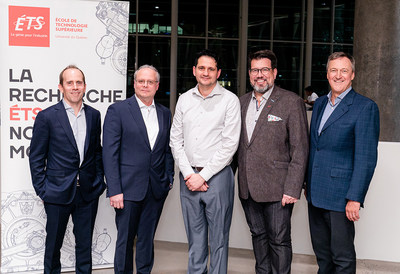Subjects: PER, CPG
Not just a technology trend, artificial vision is a necessity for the growth of many applications
ÉTS and Orthogone launch an Industrial Research Chair
MONTRÉAL, Jan. 14, 2020 /CNW Telbec/ - The rapid growth of autonomous transportation, industrial robotics and medical imaging is largely due to the ability of algorithms to interpret images. And although spectacular advances have been made in the fields of artificial vision and machine learning, many technical challenges still need to be overcome before artificial vision reaches its full potential. École de technologie supérieure (ÉTS) faculty researcher Ismail Ben Ayed and Orthogone Technologies will meet these challenges using deep learning.

Thanks to the Orthogone Industrial Research Chair in Artificial Vision through Deep Learning, inaugurated last December at ÉTS, Professor Ben Ayed will explore various potential solutions with Orthogone Technologies.
"Today, humans must still annotate images before algorithms can make sense of them. This process has limitations, given the huge quantities of data existing in the real world and the limited number of categories into which these data can be classified in today's virtual world", explained Ismail Ben Ayed, Professor of Systems Engineering and holder of the Chair.
The complexity is also augmented by the fact that these images can come from different types of devices, such as optical, thermal and laser sensors, and because they may have been captured in diverse contexts. For example: a car photographed during the summer season can be more easily recognized by an algorithm than a car three-quarters buried in snow. Similarly, the shape of a car can be better defined ? therefore interpreted with more accuracy by the algorithm ? from an optical colour photo than from a thermal or aerial photo, for example.
Advances in deep learning, and especially in convolutional neural networks, could permit artificial vision to surmount these obstacles. This is the path that Professor Ben Ayed plans to explore, using methodologies for multimodal and semi-supervised learning to solve problems of visual recognition.
"By working together with Professor Ben Ayed, we will be able to offer our customers additional high-value-added expertise in image processing through deep learning. This new expertise, combined with our existing know-how, will allow us to develop innovative and high performance solutions in partnership with our customers," said Luc Leblanc, President of Orthogone Technologies.
"Professor Ben Ayed is among the top 5 in the world in terms of number of publications on the subjects of image segmentation, pixels and interactive segmentation. His publications receive on average 45% more citations than the world average in this subject area. There's no doubt that this collaboration has a very promising future," concluded ÉTS Director General François Gagnon.
Founded in 2007 and now numbering more than 50 employees, Orthogone specializes in technology consulting services and technological product development, as well as offering research and development services in the embedded systems market. Orthogone designs custom sensors for applications in the medical, industrial and automotive domains. Having designed many intelligent sensors for top-tier clients, Orthogone has solid expertise in hardware and software design for a wide range of products. For more information, visit: orthogone.ca.
About ÉTS
ÉTS is one of the ten constituents of the University of Québec network. It trains engineers and researchers recognized for their practical and innovative approach, the development of new technologies and their ability to transfer their knowledge to private enterprise. CSRankings places ÉTS in the vanguard of the artificial vision branch of artificial intelligence: it ranks first in Québec and sixth in Canada for scientific publications in this domain. For more information, visit: etsmtl.ca.

SOURCE École de Technologie Supérieure
These press releases may also interest you
|
News published on and distributed by:



